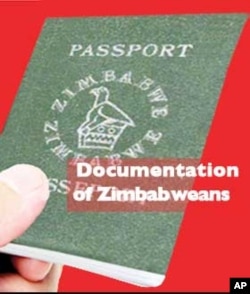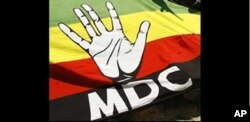South Africa’s government says early next year it will begin deporting Zimbabweans who are in the country “illegally.” New immigration rules say they must have entered South Africa before May 31, 2010, and must be able to show they are working, studying or running businesses.
“The South African government is doing this so that we regularize the stay of Zimbabweans... who (are) contributing to the development of South Africa,” says Jackie McKay, one of the officials driving the process. He’s chief of immigration services and a deputy director general of home affairs.
The revised regulations have quashed a “special dispensation” granted undocumented Zimbabwean migrants in April last year. The permit allowed them to legally but temporarily live and work in South Africa.
Now, only migrants with valid Zimbabwean passports and the necessary – and sometimes complicated – documentary proof of work, study or business qualify to apply for the new temporary residence permits. Their applications must be filed by December 31.
Observers say the new regulations create the potential for mass deportations of Zimbabweans from January 1, since many migrants don’t conform to the new rules.
“Most Zimbabweans in South Africa work very informally and will not be able to go through the intricate bureaucratic processes required by the end-of-the-year deadline,” says Gabriel Shumba, a lawyer and executive director of the Zimbabwe Exiles Forum. “Also, most do not have passports and we believe it’s impossible for the Zimbabwe government to deliver these to the masses of Zimbabweans presently living in South Africa by December 31.”
Situation in Zimbabwe has “improved….”
The International Organization for Migration estimates there are currently about one and a half million to two million Zimbabweans living illegally in South Africa, but some NGOs say the number is far higher.
Zimbabweans began pouring across the border into South Africa after the Movement for Democratic Change (MDC) almost beat President Robert Mugabe's ZANU-PF party in the 2000 elections. Observers who monitored the polls say Mr. Mugabe’s supporters attacked MDC supporters, a charge Harare denies. Since then other elections have also been marred by violence and allegations of rigging by President Robert Mugabe.
In recent years, agriculture has collapsed in Zimbabwe following ZANU-PF’s seizure of white-owned farms. There’ve been widespread food shortages and Zimbabwe’s currency has become almost worthless. The country now has an unemployment rate of about 80 percent and political violence endures.
Yet, as a basis for their new immigration rules, South African authorities say the situation in Zimbabwe, following the establishment of a power-sharing government about 18 months ago, has “improved enough” to allow Zimbabwean exiles to return to their homeland.
McKay emphasizes, “The South African government is not targeting Zimbabweans in any way, but our new immigration laws will, as from next year, target anyone who is in South Africa illegally.”
Crackdown and xenophobic attacks
Analysts say the new ordinances pertaining to Zimbabweans are the beginning of a South African crackdown on illegal immigrants. People from all over Africa have been flocking to the continent’s strongest economy since the early 1990s.
“There will be deportations of all illegal immigrants in South Africa, not only Zimbabweans. The South African government will do all it can to deter illegal movement from our neighboring states,” says McKay.
Zimbabwean human rights activist and academic, Elinor Sisulu, says she understands the South African authorities’ worries about “uncontrolled” migration.
“I do think the magnitude of the migration (from Zimbabwe) is such that it does cause problems in South Africa,” she states. Sisulu says the immense influx of Zimbabweans into the country in recent years has “strained” poor working class South African communities “who are the main hosts of all these immigrants.”
It led, in her opinion, to the “so-called xenophobic attacks” on Africans – including Zimbabweans – across South Africa in 2008.
“There’s been a lot of pressure on the South African cabinet for it to act around the issue of foreigners in South Africa,” says Zimbabwean-born South African refugee rights advocate, Braam Hanekom. He’s founder of the group, People Against Suffering, Suppression, Oppression and Poverty (PASSOP), which represents the interests of the many illegal immigrants living in South Africa.
Hanekom warns, “There’s still the threat of renewed xenophobic attacks, because frustration in poor communities is still running high.”
Tara Polzer, one of South Africa’s most respected analysts of the Zimbabwean inflow, says, “What this (documentation) initiative does, from the highest levels of government, is it sends a clear message to the population of South Africa that foreigners – and Zimbabweans in particular – are not boogiemen, but this is a group of people in the country being productive and that we are recognizing their value to the country and regularizing them officially.”
Polzer’s a senior researcher at the University of the Witwatersrand’s Forced Migration Studies Program. She describes the Zimbabwean “regularization” project as a “very positive political signal to send to the grassroots at the moment (that will hopefully prevent attacks on Zimbabweans).”
But Shumba says some “cynics” see the South African government’s move to document Zimbabweans as a “vote-catching exercise” ahead of local government polls.
“(They) believe that as South Africa is going to have (municipal) elections next year, so they should be seen to be deporting foreigners because that has been one of the major issues with regards to this country – that there’s high unemployment and that Zimbabweans are stealing jobs in this country.”
Polzer, though, doesn’t believe the state’s new immigration policies are intended as a means to identify illegal Zimbabweans in order to deport them. “I do think it comes out of (a) long chain of reasoning and not now some new particular political motivation,” she says.
Polzer explains, “I do know there have been many years of discussions in the South African government of appropriate ways of regularizing Zimbabwean movement, but it’s just taken a very long time to come up with mechanisms the South Africans think is appropriate to achieve this.”
She does, however, acknowledge that large-scale deportations of Zimbabweans could be an “unintended consequence” of the South African “regularization” drive.
Decision welcomed….but timing criticized
A wide range of people concerned with South Africa’s new immigration procedures and their impact on Zimbabwean migrants have said they welcome the new rules “in principle” and “on paper.”
“We are actually pleased by the decision and we would like to applaud the South African government because there are very few countries that would actually want to regularize foreign citizens so that they can be able to work, study and own businesses,” says Austin Moyo, the leader in South Africa of the MDC, one of the parties that shares leadership in Zimbabwe’s government.
Polzer says, “It’s certainly a recognition by South Africa that Zimbabweans are in the country to stay and that a very, very large proportion of them are a very positive force in the economy…. That really is a shift from the thinking in the past that saw pretty much most migrants as informal, illegal and therefore bad.”
But most observers oppose the timing of South Africa’s new immigration requirements. They maintain the regulations should only be implemented once there’s “real” political and economic reform in Zimbabwe, to give illegal immigrants who don’t qualify for South African residence a better chance of surviving in their homeland. They also say Zimbabweans in South Africa aren’t being given enough time to take advantage of the revised system, and that many – including the unemployed – will be excluded from the process and thus face deportation.
Polzer acknowledges, “In practice, this is going to be a very difficult process. In principle, (it’s) a very good thing; in practice, (there are) probably still a lot of gaps.”
“Regularization” could end cycle of abuse
Nevertheless, analysts like Shumba agree the documentation of Zimbabweans holds many advantages for those who qualify for residence permits.
“It ensures that our people from Zimbabwe who are based in South Africa have their dignity restored,” the lawyer says.
“With legal permits we will be able to come out in the open and access, for example, South Africa’s health care system. Sick Zimbabweans have for many years been afraid of visiting state hospitals because officials there ask them for documents to show they are in South Africa legally, which many did not have. Some have died without access to health care here,” he says.
Shumba adds that “illegal” Zimbabweans have been “suffering abuse” from the South African police and local criminals. “The police would sometimes threaten them with deportation unless they paid big bribes, and the criminals would commit all sorts of crimes against the illegal Zimbabweans, confident that the crimes would never be reported because the Zimbabweans were afraid of the police and (consequent) deportation.”
He says he personally knows “quite a few Zimbabwean women who have been raped by South African criminals and policemen, but have never reported the rapes…. Hopefully these new regulations will end this cycle of abuse of Zimbabweans in South Africa.”
“Positive” move to include “unskilled” Zimbabweans
Polzer’s enthusiastic, saying the new South African visa plan makes it possible “at least on paper” for Zimbabwean domestic workers, construction workers, waiters and farm workers to get residence permits.
“One of the good things about this process is that it very explicitly includes semi-skilled and unskilled kinds or work,” she says.
Polzer adds that it’s also “extremely positive” that the revised regulations allow Zimbabwean small business owners to remain legally in South Africa.
“So (the state is) not only including people in the formal employment sector employed by big business, but they recognize Zimbabweans’ entrepreneurial spirit and appreciate that they are contributing towards South Africa’s economy. We’ve never had this kind of sensitivity before on the part of the government,” the researcher says.
But Polzer agrees it’s going to be “difficult” for many Zimbabweans employed informally in South Africa to get residence permits. “They do have certain documentation requirements that are probably going to be difficult for a lot of people to get,” she predicts.
But for those who are successful, Polzer says “the time frame of the permits that are being promised (is) very generous.” Successful applicants will be able to remain legally in South Africa for the next four years.
“That is very sensible,” Polzer maintains. “That is understanding the medium and long term integration of (South Africa and Zimbabwe); that is understanding the needs of the economy; that is understanding the needs of individuals who need to plan their lives. So that is a very good thing.”
But, emphasizes Shumba, the battle to obtain legal residence in South Africa is proving to be a “next to impossible” task for the vast majority of Zimbabweans living there now.
He says, “Unnecessary bureaucracy, confusion about what is required to get the permits, the failure of the Zimbabwean authorities to deliver passports, the incompetence of officials – all these things are conspiring against Zimbabweans who desperately want to legally stay in South Africa.”
(VOA will highlight the problems experienced by Zimbabweans under South Africa’s new visa regime in following installments of a series of stories on this issue)












